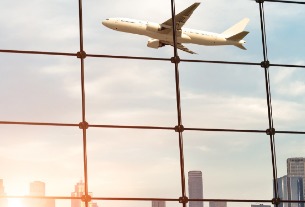SUCCESSIVE fare increases, a sharp reduction in flights and seats, crammed planes, chronic delays and missed connections — all of these would seem to argue that business travel is falling.
But so far, travel agencies say, business travel is holding steady, although companies are tightening their belts.
“The majority of our clients are traveling as much in terms of frequency, but their companies are finding ways to do things less expensively,” said Dean Sivley, the chief operating officer of Orbitz for Business, the corporate division of the online booking site.
“They’ve cut down on travel expense, but not at the cost of not going,” he said. “The companies are just getting more creative.”
Now, hearing the word “creative” in a sentence about corporate management of travel makes some business travelers nervous. Does “creative” mean that they will soon be seeing memorandums extolling the virtues of sharing hotel rooms? Or hitchhiking on the Interstate as a way to meet new clients?
Not quite. At least not yet. A recent Orbitz survey conducted with Business Traveler magazine found that more than two-thirds of over 600 business travelers said they were now staying at less expensive hotels or, when possible, leaving and returning the same day to avoid a hotel altogether.
And as far as confining travel to a single day, that eliminates the hotel. But it also means you’re more likely to be rolling out of bed at 4 a.m. — something that nobody who isn’t working in a firehouse should be required to do. And you’ll probably be rolling home in time for “The Daily Show With Jon Stewart” at 11.
And arranging a same-day trip to save money is tricky now that the airlines have revived the Saturday night and other minimum-stay requirements that make it far more difficult to get a cheap fare without spending the weekend on the road.
I looked at two other surveys. In one, by American Express, working with CFO Research Services, most respondents said they expected to get “more from their travel dollars” by tightening controls on spending.
“We’re seeing a focus on discretionary spending on travel to conferences and noncritical meetings,” said Gunther Bright, a senior vice president at American Express.
The survey also showed that companies were tightening spending for first-class and business-class travel on long-haul flights. Many companies used to allow premium-class travel on flights over six hours. “Now that’s being extended to seven, eight or nine hours,” he said.
Still, 19 percent of companies in the United States said they expected their international business travel to increase over the next 12 months, and 41 percent said they expected it to remain the same.
Mr. Sivley at Orbitz, agreed that companies were raising the bar for premium international travel. Others, he said, were adding incentives like a “take somebody along” offer. Opt to fly coach and not business class, and the company will pay for a spouse or other companion to accompany the employee.
Not all the projections were as upbeat about the prospects for business travel. The Association of Corporate Travel Executives, in an informal survey of members last week, found than more than half of the 128 corporate respondents said they had already cut back on business travel. Nearly two-thirds said the reduction in airline schedules and service, especially in smaller markets, was adversely limiting their options to meet directly with manufacturers, suppliers and buyers.




